
OR
The danger right now is that the two sides are not even talking
Published On: June 30, 2016 12:10 AM NPT By: Republica | @RepublicaNepal
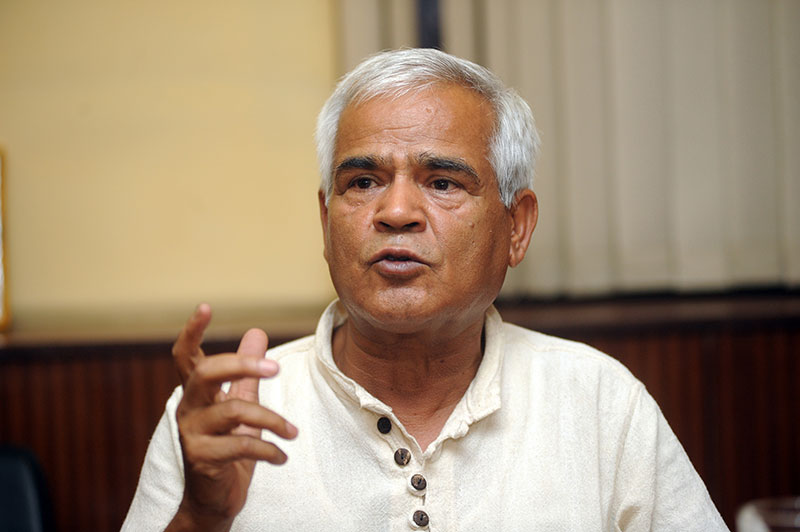
Political analyst and Professor of Political Science Krishna Khanal argues that timely elections of local bodies, provincial assemblies and federal parliament is the only solution to the current political and constitutional logjam. He, however, maintains that agitating Madheshi forces must be taken into confidence first. He discussed some of these issues in an extensive interview with Republica’s Biswas Baral and Mahabir Paudyal.
First of all, how do you characterize the state of Nepali politics at the moment?
Principally, it is a state of political crisis that has brought a number of constitutional issues to the fore. Nine months after the promulgation of the constitution, politics is yet to take a definite course. It has not moved forward at all. The constitution envisages a new political system. The constitution, for instance, states that the prime minister can form a cabinet of 25 members. It says the president will be elected from an electorate college comprising members of both houses of national parliament as well as provincial assemblies. The president we have has not come through this process. The cabinet size also exceeds the limit set by the constitution.
We are thus in a transitional phase with the prime minister, president and speaker all elected under transitional provisions. This does not happen in a normal situation. Normally, the head of the state and the head of the government at the time of the promulgation of constitution remain in power until new elections are held as per the new constitution. We made new government formation under transitional provisions the main basis of the constitution. The new constitution is thus only partially active.
What is the main hurdle for complete implementation of the constitution?
The failure to take major political stakeholders on board, I would say. In other words, they have failed to take Madheshi forces into confidence. Yes, the constitution is functional in terms of provisions related to people’s fundamental rights. But a constitution is not only about civil rights.
But Congress and UML say the first amendment of the new constitution has already addressed the concerns of Madheshi forces.
The amendment makes only cosmetic changes. Earlier it was said ‘geography and population’ would be main basis for delineation of electoral constituencies. The amendment reworded it as ‘population and geography.’ What is the difference? The word ‘inclusive’ was replaced by ‘proportional inclusive.’ Madheshis have four main issues—demarcation of provincial boundaries, proportionate representation, inclusion and citizenship. For example, on citizenship, they contend that the constitution has made too many exceptions regarding the high-level positions naturalized citizens can occupy.
The main problem right now is that the two sides are not even talking to each other. There is no dialogue. This is alarming. The ruling UML party seems rigid over the concerns of Madheshi parties.
But the government has repeatedly called on the Madheshi parties to come for dialogue.
Sometimes unseen factors also determine political course. What is seen is that Madheshis forces are seeking the government response on their 11-point demands, which boil down to the four issues I just mentioned. As far as I know, the Madheshi parties are flexible even on the main issue of federal demarcations. But the ruling parties do not seem willing to consider the options being floated by Madheshi parties. On the other hand, Madheshi forces have also failed to come up with a clear and comprehensive roadmap. There is also confusion over whether the government should hold talks with the Madheshi Morcha or the Federal Alliance. Then there is Nepali Congress which professes support for Madheshi forces, but which has no action plan to carry out their agenda. Instead of helping solve problems, a dangerous trend of dividing people on ethnic lines is taking root.
Could you talk about the dangers you allude to?
For instance there is now a dangerous narrative of the hegemony of Khas-Arya. Everyone of Khas-Arya origin is lumped together. But the truth is that many Khas-Aryas are themselves criticizing the government, calling for early settlement of outstanding issues. I fear we are slowly headed to a dangerous level of polarization. Ethnicity, caste and religion are the easiest political tools to rouse the masses. But people suffer.
It seems both the ruling parties as well as the agitating forces are happy to bide their time so that they can negotiate from a position of strength.
It is difficult to assess if a situation constitutes a position of strength or not. I remember a time when Girija Prasad Koirala was the prime minister. The opposition had obstructed the house over what they thought was government failure to tackle Maoist insurgency. I asked Koirala if he would resign since he had failed to clear the obstruction of parliament. He said he would not resign. In that case, I advised him, he must quickly initiate dialogue with the Maoists. He said he was not going to do that either. He said he would negotiate only from a position of strength. He first wanted to bring his opponents down to their size. I reminded him that the opposite was happening: his opponents had significantly weakened his position. If Prime Minister KP Oli is thinking along the same lines, he is making a mistake. You cannot assess the strength of parties in Madhesh now. The region where half of the country’s population lives is in turmoil.
The situation is volatile. From the outside, things look normal. But collective psychology in Madhesh is that Kathmandu has repressed and ignored Madheshis. The situation in the Tarai plains is not under the control of any party. If you cannot bring the region where half of the population lives into national mainstream, no other political tool will work. So this waiting game could prove counterproductive.
But haven’t Madheshi forces also contributed to the radicalization of the masses in Tarai-Madhesh?
I think our way of conceptualizing the issue of nation is problematic. There is a marked difference between a nation and a state. In our civilization, it is hard to draw a line between rastra, rajya, desh and muluk. But western political scientists have set a clear line between a nation and a state. Nation refers to belongingness of the people. So if someone says he is a Madheshi or a Newari, he is professing his identity of a nation. State is a political entity. You should not confuse the two. When Madheshis say they are a separate nation, it is more related to their identity. In western conceptualization, a community which has its own history and territorial origin is called a nation. With this parameter, Madhesh is also a nation, just like Newar community and Tamang community are different nations. We should also understand that those who talk about Madhesh nation are not those demanding Madhesh as a separate state. This is an important distinction.
If so why are some of them now talking of secession?
Sometimes the agitating parties harden their position as a bargaining chip. I see no threat of secession in the Tarai. The real threat is of anarchy and chaos. When the state fails to make its presence felt, whether a country is an integrated whole or disintegrated holds no meaning. This is why it is important for state actors to make people in Tarai realize that their legitimate demands will be heard.
There also seems to be lack of conceptual clarity on who are real Madheshis.
Yes, we have a definitional problem regarding caste and ethnicity in Nepal. There are modern scientific instruments to determine who belongs to which ethnic group. But here ethnicity is being used as a political tool. So every ethnic group claims higher percentage and they even claim that they share similarities with other communities.
What do you call a person who has resided in Madhesh for three generations? Is he a Madheshi? No, he is a resident of Madhesh. I have been living in Kirtipur for seven generations. So am I Newar? No, I am a resident of Kirtipur.
The sad part is we have no legal document that defines which caste group belongs to which ethnic community. Harka Gurung’s anthropological study offers some insights. Except this, there is no credible source to define your caste and ethnic origins. The constitution should have clearly defined the term ‘Madheshi’ in annex and schedule. At the root of this confusion, again, is the politicization of ethnicity.
Would it be right to say Indian intervention in Madhesh has only added to the polarization?
I see it a bit differently. Both China and India have their concerns in Nepal. We think India incited Madheshis. I don’t see it that way. It is true that India played the Madhesh card. But that does not mean all demands raised by Madheshi have India’s backing. For example, India is not bothered about how many provinces there should be in Madhesh. India’s concern is with Kathmandu. It won’t limit itself to Madhesh, especially when China’s influence in the region is growing.
Yes, the blockade was a blunder on India’s part. Rarely does a country go that far in diplomacy. India behaved as if the two countries were at war. India has realized that folly and so of late it seems to be in a mood for course-correction.
We need to understand Madhesh-India relation in a different way. People living along the border share cultural and communal ties with people of India. Political borders in such cases are arbitrary. Political actors need to have the ability to manage such cross-border ethnicity-related issues, the issues which cannot be wished away.
Earlier you said there is no secession threat in Tarai-Madhesh. What if the call for secession intensifies?
That will be dangerous. You should not create a situation where people are divided into clear ‘yes’ and ‘no’ camps. The situation today in Tarai is that people are neither in favor of secession nor do they feel any connections with Kathmandu. People have grievances against Kathmandu but they are not in favor of completely severing ties either. At one point the radical voice of CK Raut was popular in Tarai. But you do not hear people talk of CK Raut these days. Madheshi forces are clear that secession is not the solution. It is important to bear in mind that unless Tarai plains see a level of stability, you cannot imagine development and stability in the country.
The tendency in Kathmandu is to look at Madhesh problems through Indian lens. Yes, India has meddled in Madhesh. It has used the Madhesh card. Madheshi leaders have themselves admitted this. But cross-border politics has complex dynamics. We have seen its manifestations in recent days but a number of countries sharing borders facing such problems. You cannot change cross-border realities. You cannot change demography and physical realities of southern plains. A big section of the population of Tarai plains shares cultural ties with people of India. We need capable leaders to address Madhesh issues based on these realities.
What is the way out then?
This takes us back to the first question with which we started our conversation. We should start with the political course envisaged by the new constitution. But to do so there will first have to be an election. We need to sort outstanding issues and hold elections of local bodies, provincial assemblies and federal parliament at the earliest.
This is what Prime Minister KP Oli has also been saying.
We do not need election for the heck of it. First, we need to create a conducive environment for such election. People do not take the prime minister’s call for election seriously because there is no political environment for such elections. You need to take Madheshi forces into confidence first. Madheshi forces are not like Mohan Baidya and Biplab-led parties which boycotted the Constituent Assembly elections and which have rejected the constitution altogether. Madheshis have reservations with certain provisions of the constitution. They want amendments. Congress, UML, Maoist (Center) and Madheshi forces should thus come together to amend the constitution. That will be first meaningful step in holding election. How can you play the game if you haven’t even set the rules?
You May Like This
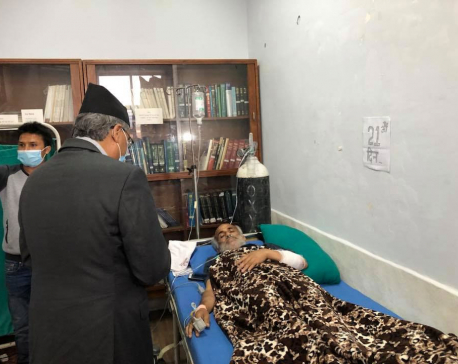
“You are not alone; millions are behind you,” Deuba to Dr KC
KATHMANDU, July 20: Former Prime Minister and Nepali Congress President Sher Bahadur Deuba has urged the government to immediately hold... Read More...
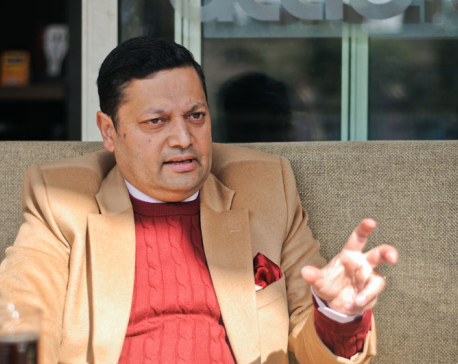
The real danger is when both India and China conclude Nepal is a burden
The Director of Center for South Asian Studies, Nischalnath Pandey, is a keen student of diplomacy in South Asia and... Read More...
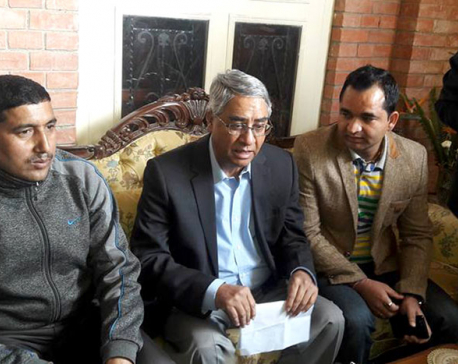
We are not with Lokman, we are with rule of law: Deuba
KATHMANDU, Oct 23: Nepali Congress President Sher Bahadur Deuba has said that he is in favor of the rule of... Read More...


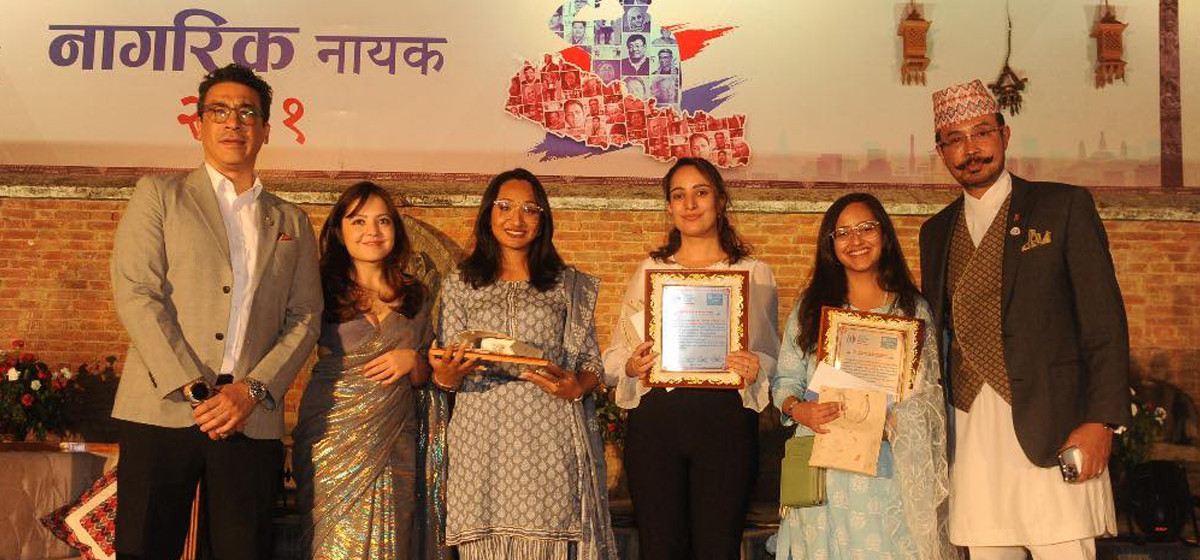

Just In
- Prez Paudel solicits Qatar’s investment in Nepal’s water resources, agriculture and tourism sectors
- Fire destroys 700 hectares forest area in Myagdi
- Three youths awarded 'Creators Champions'
- King of Qatar to hold meeting with PM Dahal, preparations underway to sign six bilateral agreements
- Nepal's Seismic Struggle and Ongoing Recovery Dynamics
- Shrestha nominated as Chairman of NCC's Advisory Council
- Take necessary measures to ensure education for all children
- Nepalgunj ICP handed over to Nepal, to come into operation from May 8




_20240423174443.jpg)





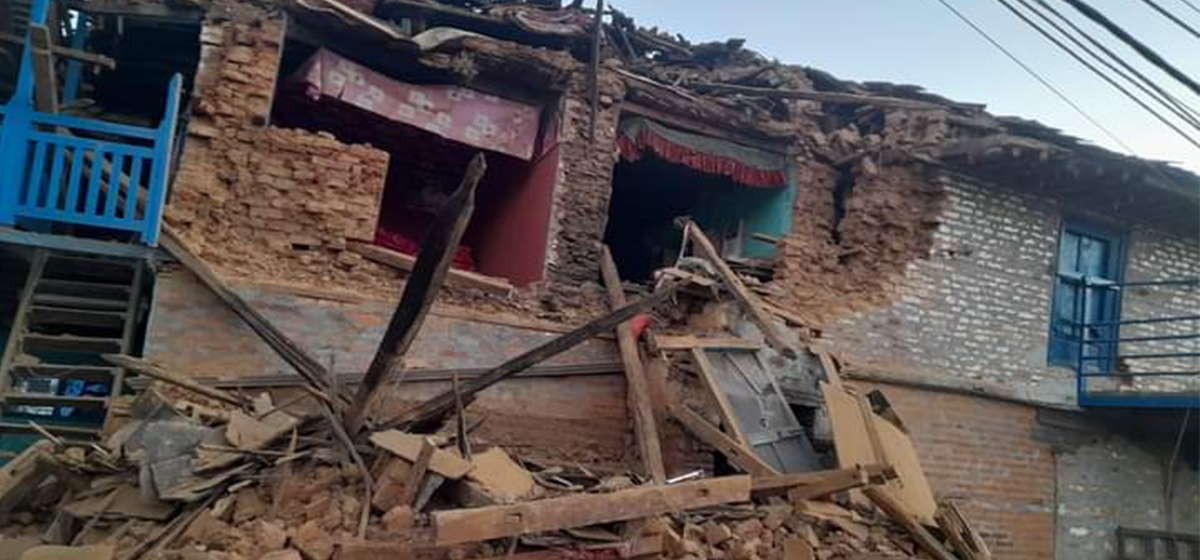
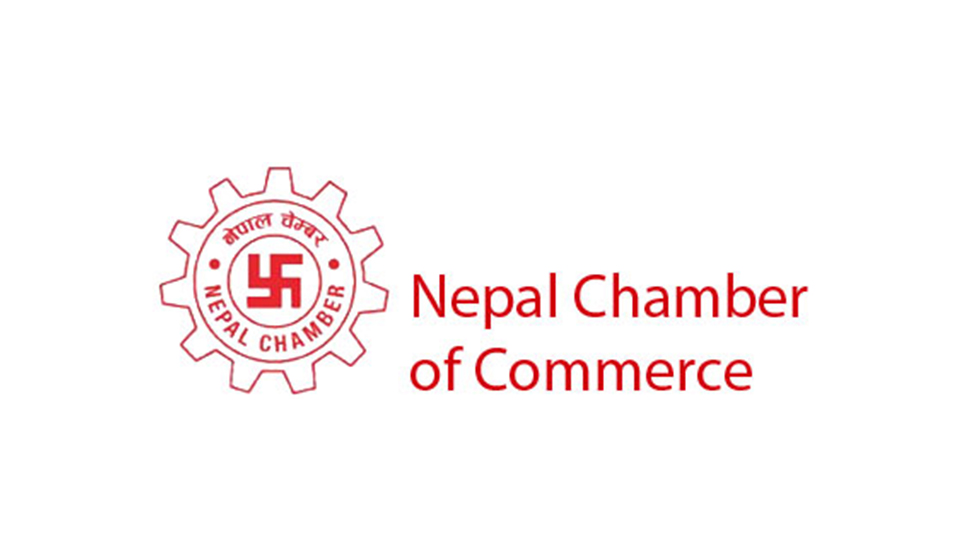
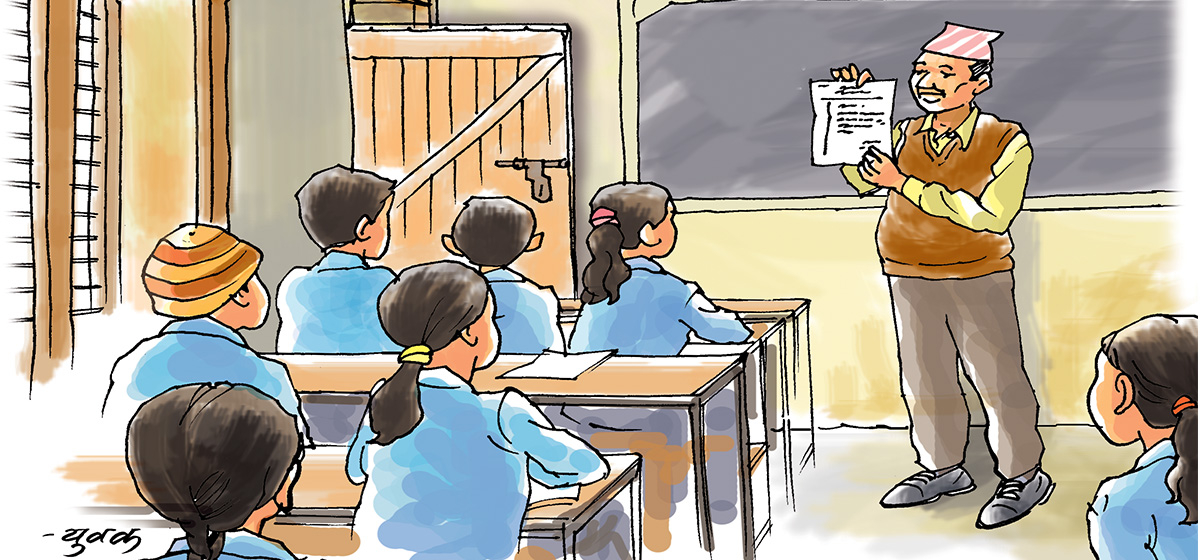

Leave A Comment